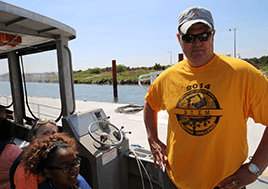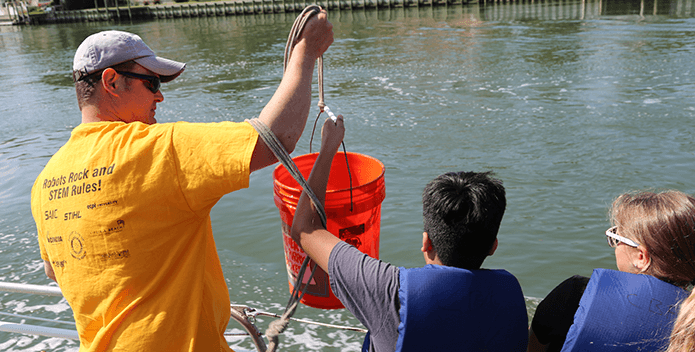Dr. Aaron Spence is the leader of the fourth largest school division in Virginia serving more than 67,000 students, and the 2018 Virginia Superintendent of the Year. Virginia Beach City Public Schools (VBCPS) has been a flagship partner with CBF for more than 30 years and has recently co-developed one of the largest systemic environmental literacy programs in the country. Recently, Dr. Spence shared his thoughts on the importance of the work that VBCPS and CBF have undertaken together and his vision for environmental literacy for Virginia schools and students.
The state of Virginia is committed to advancing environmental literacy for all students. How has VBCPS taken up this charge and how have partnerships with organizations like the Chesapeake Bay Foundation supported those efforts?
In VBCPS, we understand the crucial role communities have to play in ensuring the sustainability of our natural resources. How could we not? We are a water city, with tidal rivers like tendrils reaching nearly every part of our geography, and we are bordered by the beautiful waters of the Atlantic and the Chesapeake Bay. As such, we've embraced the idea that we must practice sustainability as an organization—and we are nationally recognized for our work in energy management and facilities construction and maintenance.
Beyond that, though, we also know that our students must think about these issues and be prepared to lead us as we solve these challenges. We view partnerships with organizations like CBF as a way to extend the walls of our classrooms and have our students taking what they are learning in a textbook out into their own backyards. Whether it's looking at the conservation of our watersheds or the restoration of our oyster population, students are working with content experts like CBF to get a first-hand look at what the challenges and opportunities are within this city.

Dr. Aaron Spence is the superintendent of Virginia Beach City Public Schools, which is a leader in outdoor, field-based education, sustainability, and environmental literacy.
VBCPS
How would you describe the impact of outdoor learning and environmental education on student academic achievement and stewardship in Virginia Beach? How has collaborating with partners such as CBF contributed to those impacts?
In education we are deeply interested in changing the way our students think about and approach learning. The highest aspiration I think we can have for our students is that they never have to ask the question, “Why am I learning this?” We think in order to do this, kids have to have agency in learning—they have to be able to make choices about how to learn and what they want to learn and how they want to show they've mastered something. With that, one of the things we believe is really important is for students to make personal connections not just to content in their math class, for example, but across the disciplines.
For Virginia Beach, environmental literacy is a perfect example of how enriching a cross-curricular education can be. Through partnerships like the ones we have with CBF, students are not just learning a wealth about scientific discovery and investigation; they are also developing their ability to collaborate, to think critically and creatively and to begin solving real-world problems and issues in our community. This last piece is really important because one of the traits we are also trying to develop in our students is empathy—the ability to understand the needs of others and see their perspective—and taking ownership of, and understanding the value of stewardship of, our natural resources takes a student out of their internal view of the world and helps them see the greater challenges facing us all.
VBCPS is recognized on both a regional and national level (NOAA B-WET) as being a leader in outdoor, field-based education, sustainability, and environmental literacy. Would you share some examples of ways that VBCPS has served as a model for other districts and describe your plans for advancing these initiatives into the future?
I think one of the main keys to our success has been the differentiation of these opportunities and these experiences so that it is applicable and meaningful for each and every grade level and so that we are building a solid foundation early to grow throughout their careers with us. So, for example, our pre-K classrooms will meet with local beekeepers and talk about bees and how they help flowers grow. Then, in third grade, that conversation is shifting to talk about local animals in danger and the ecosystem. By seventh grade, students are doing water quality analysis of the Chesapeake Bay and so on and so on.
Of course, we recently wrapped up a three-year grant with CBF funded by NOAA B-WET, in planning professional development on creating Meaningful Watershed Educational Experiences (MWEEs) to be held this summer and fall.
I also think our team works diligently to give students opportunities for passion projects through various courses. One specific example of that is we had an AP Environmental Science student who wanted to address the issues of deforestation. So, he partnered with local organizations and elementary schools to plant trees on Arbor Day, and ended up planting more than 1,000 trees.
All of these examples—in addition to the way we lead by example as an organization through our own emphasis on sustainable practices—are creating momentum and interest across the region and the country. We've been able to collaborate with other curriculum teams and teachers through local organizations, and we've been able to share our thinking nationally through conferences and participation with partners like CBF and the Green Schools National Network.
What inspires you to champion sustainability education for VBCPS teachers and students?
My belief is that we have to provide the best possible learning environment for every child, every day, and that the learning should be meaningful. When I was a principal, I spent several days on Smith Island with the CBF learning about the challenges the Bay was facing; this experience both bothered and inspired me—and it also convinced me we could ask our students to think about these issues more deeply.
Quite frankly, we would not be doing our job if we are not having open and honest conversations about our environment and what we all need to do as responsible and global citizens to support and protect our natural resources. Most importantly, perhaps, this is deeply personal for me. I grew up on the Chesapeake Bay. I spent my youth swimming in waters brimming with blue crab. I want my own children to have the same experiences I did, and I worry that if we don't embrace teaching them and their peers to solve these problems and be leaders in this work, they will not have those opportunities.
What are you excited about in the future of the VBCPS CBF partnership?
What most excites me about the future of our CBF partnership is that its potential is limitless. When I look back and reflect on how this partnership has grown since I arrived here just over four years ago, I cannot wait to see what is in store for the next years to come.
Tom Ackerman, Vice President for Education
Issues in this Post
Education CBF in Virginia Hampton Roads Office Virginia Office, Richmond



